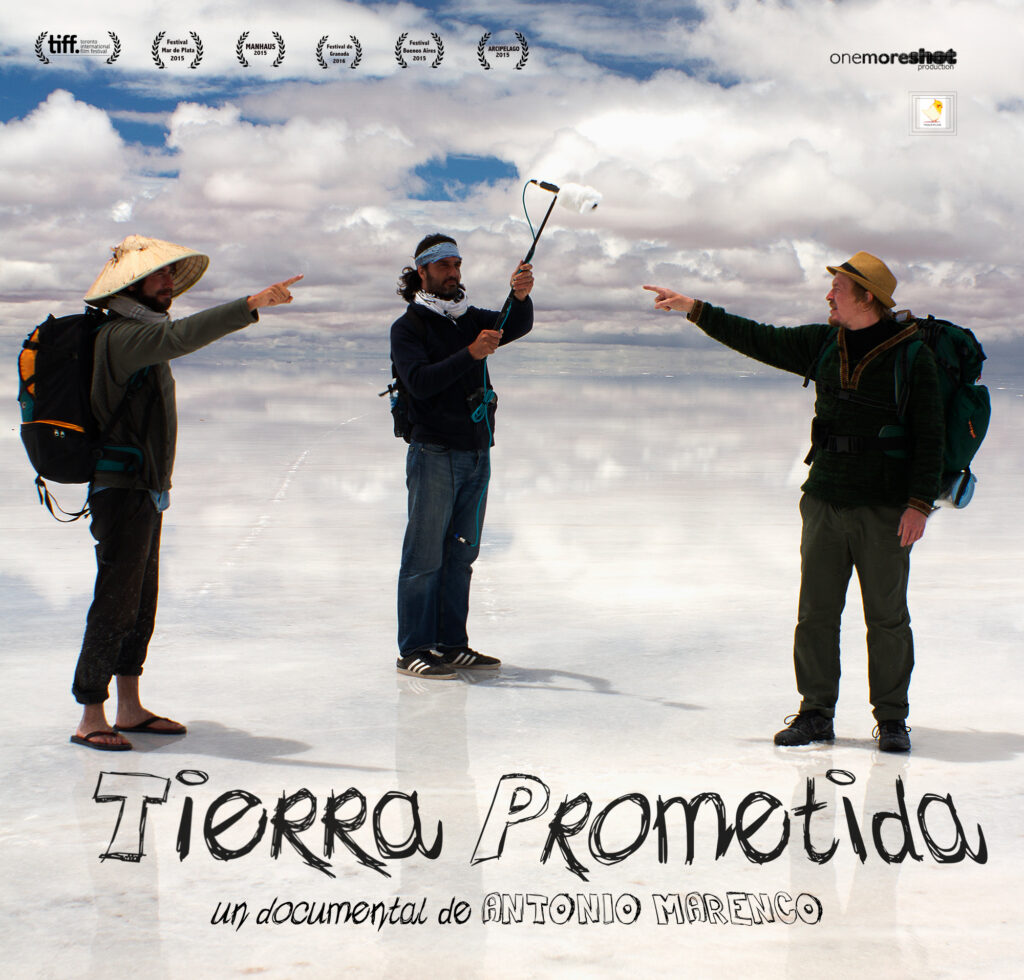A selection of projects and experiments — fiction films, documentaries and hybrid essays. Browse the work below, or contact me to collaborate.

Synopsis
Wolves and shepherds clash in an ancestral struggle that has shaped the landscape for centuries. Amidst this fragile balance between wilderness and survival, a young man is initiated into the secrets of an ancient coexistence — one that blurs the boundaries between tradition and legend. Through his journey, the past and present intertwine, revealing a world where myths still breathe, and where the bond between human and nature must be constantly renegotiated.
Technical Sheet
Title: Il Luparo
International Title: Wolves Hunter
Genre: Creative Documentary / Essay Film
Running Time: 75min
Format: 5,6k – 4/3
Production Company: Boicot Films
Country of Production: Spain / Italy
Original Language: Italian
Status Production
Teaser https://youtu.be/OJ-B3d_JB5s
Project Path / Development
The project took part in the Meet the Producer program organized by Catalan Films.

Synopsis
Two geniuses of modern physics — Werner Heisenberg and Ettore Majorana — confront the rise of the atomic bomb in radically different ways: one disappears, the other sabotages from within.
Through historical reconstructions, archival footage and interviews with contemporary scientists and philosophers, Sabotage revisits the ethical and human trajectories of two of the twentieth century’s greatest minds. Between silence and resistance, disappearance and ambiguity, the film explores how thought itself can become a battlefield — and how scientific knowledge carries both the power to illuminate and to destroy.
Technical Sheet
Title: Sabotage
International Title: Sabotage
Genre: Documentary – Archival / Interviews – Historical Drama
Running Time: 50–60 min (TV)
Format: 4K / HD
Production Company: Gris Medio Productions
Co-production: [Open to partners / broadcasters]
Country of Production: Spain / Italy / Germany
Original Language: Italian, English, German
Producers: Boicot
Genre keywords: Quantum physics, ethics, history, science and power
Project Development
The project was developed with the support of Boicot Films.
The film seeks further development support and co-production opportunities with broadcasters and cultural funds.
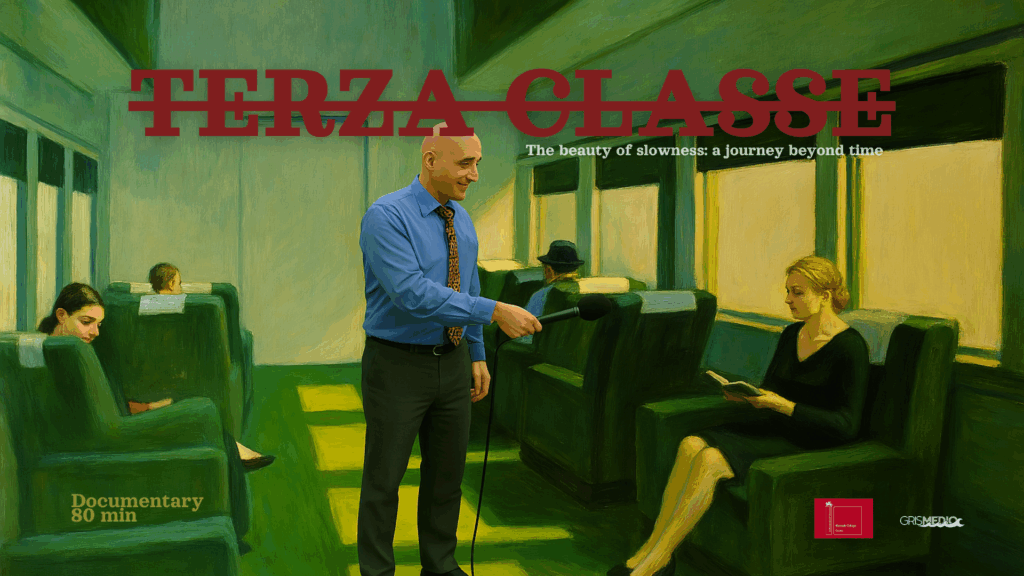
Synopsis
«The journey is a mirror of the soul. Every traveler carries within themselves the life they seek,
even if they do not know it yet.» — Italo Calvino
Terza Classe is a contemplative journey aboard the regional trains of Puglia — the last “slow trains” in Europe. Through a hybrid approach that blends direct observation and cinematic storytelling, the film captures the daily lives of commuters whose paths cross in the worn carriages of a world suspended between decay and resilience.
Here, modernity feels distant, yet life pulses with unstoppable truth. Each passenger — the elderly couple, the silent artist, the distracted mother, the conductor lost in routine — becomes a fragment of a fragile but enduring humanity. Amidst noise, silence, and endless delays, the train becomes a moving metaphor for memory, time, and the quiet persistence of ordinary lives.
Technical Sheet
Title: Terza Classe
International Title: Third Class
Genre: Creative Documentary / Observational Cinema
Running Time: 80/50 min (TV version)
Format: Digital HD / 4K
Production Company: Gris Medio
Co-production: [Open to international partners]
Country of Production: Italy / Spain
Original Language: Italian
Keywords: Slow travel, identity, everyday life, Southern Italy, human geography
Director’s Vision
Terza Classe is not only a documentary but an act of resistance against oblivion. The railway becomes a metaphor for transition — a space where identities shift and memories crystallize.
Inspired by the visual solitude of Edward Hopper, the stillness of Giorgio Morandi, and the observational eye of Henri Cartier-Bresson, the film seeks poetry in the ordinary. The camera moves discreetly among passengers, observing gestures and silences that reveal more than words.
In an era obsessed with efficiency and speed, Terza Classe celebrates slowness as a form of resistance — a way to rediscover empathy, presence, and the fragile beauty of the everyday.
Project Path / Development
The project was presented for the Biennale College Cinema development program, as a work in progress.
It continues development under Zoorama and RioFilm, with plans for co-production between Italy and Spain.

Synopsis
In the nostalgic bars of Catalonia, “pajareros” (bird enthusiasts), like migratory birds, find refuge and a shared song that defies the loneliness of modern existence.
Mundo Pájaro is a visual poem that takes us to the heart of this singular community and into the solitary life of Juan and his friends.
Through their gazes, silences, and the singing of their birds, we explore the paradox of loneliness in a hyperconnected world. The singing competitions, beyond rivalry, become rituals that celebrate nature and reflect the human condition.
Technical Sheet
Title Mundo Pájaro
Genre Creative Documentary
Format 4K Digital, Color
Duration 75 minutes
Language Spanish / Catalan (with English subtitles)
Director & Screenwriter Antonio Marenco
Production Company Boicot / Gris Medio
Country of Production Spain
Status In Development
Estimated Budget €250,000
Producers Gris Medio & Antonio Marenco
Short Film Reference Mundo Pájaro (2024, 15 min)
Teaser https://youtu.be/wnJfSTNHI4w
Project Development
Mundo Pájaro began as a short documentary that explored the intimate world of Catalonian bird keepers. Following its warm reception, the project was selected for the Fast Forward program, where it received international guidance on narrative expansion and visual development.
Subsequently, Mundo Pájaro was selected for the DOC Barcelona Campus, an incubator dedicated to mentoring emerging documentary voices. There, the project refined its dramaturgy and co-production strategy, positioning itself for international collaboration and festival visibility.
The feature-length version deepens the exploration of solitude, ritual, and companionship through observational storytelling. Drawing inspiration from filmmakers such as Pedro Costa and Gianfranco Rosi, the film adopts a contemplative and sensory approach — a cinema of presence, where emotion emerges through gesture, silence, and song.
Development Goals (2025–2026):
Final script and creative development (Q1 2025)
Funding applications to ICAA, ICEC, and European partners
Co-production agreements
Pre-sales with broadcasters
Production planned for summer 2026

Synopsis
Set in the burning heart of Barcelona’s Raval district and inspired by true events, El Rey follows Marouan, a young Moroccan trying to build a new life through a vocational training program. While he dreams of independence, the shadows of petty crime and social exclusion constantly lure him back.
During his struggle, he meets Bea, a girl from a wealthy family, whose world only exposes the hypocrisy of privilege. Their brief encounter, marked by illusion and impossibility, becomes a mirror of the city’s invisible borders.
Technical Sheet
Title El Rey
Genre Hybrid Fiction / Social Drama
Format 8K Digital, Color
Duration 90 minutes
Languages Spanish / Arabic (with English subtitles)
Directors & Screenwriters Manal El Ouady & Antonio Marenco
Cinematography Andrea Sala
Production Design Jacinto Melara & Rubén Micola
Editing Anna Gallarati
Sound Design Jocelyn Chamoun
Production Company Minded Factory
Country of Production Spain / Morocco / Europe
Status Screenplay option
Estimated Budget € 1,216,000
Animated storyline https://slides.com/treatment/el-rey-dossier/fullscreen?token=zHxX8db5
Project Development
El Rey is a hybrid feature film that fuses documentary realism with narrative storytelling, inspired by the true story of a young migrant who lost his life trying to cross the border between Spain and France.
The film’s artistic vision is rooted in a documentary gaze: handheld camera, natural light, and urban soundscapes that immerse the viewer in the labyrinth of the Raval. Its visual style evokes the raw energy of Larry Clark’s Kids and the social realism of La Haine, portraying a Barcelona that both attracts and rejects.
The film seeks co-production partners in Europe and North Africa and will apply for ICAA, ICEC, Creative Europe MEDIA, and Eurimages funding.
Branded partnerships (Adidas, Nike, Puma) will be explored as part of a socially engaged marketing strategy addressing migration, youth, and identity. The project also includes community-based outreach and festival screenings with educational and cultural institutions

The fountain represents the intimate bond between humans and nature, between water and life.
The circle of connection between things — in this case, humanity and water — is both fragile and eternal.
At night, a mother approaches with buckets to fill them for her family. At dawn, children wash themselves before going to work at the port. Later, cooks, tourists, and elderly women each repeat the same ritual. Through their gestures, we witness patience, resilience, and the rhythm of daily life in a place where water is not just a resource, but a shared breath.
Technical Sheet
Title SBER (Patience)
Genre Creative Documentary / Short Film
Format 5,6K Digital, Color
Duration 20 minutes
Languages Arabic / French
Director & Screenwriter Antonio Marenco
Country of Production Morocco / Spain
Status Completed (2023)
Producer Boicot/Grismedio
Festival Premiere L’Alternativa – Barcelona (2020, short version)
Teaser/Demo https://youtu.be/g854_DGrXW4
Project story
Sber was born from an encounter in 2020, when I was working as a cameraman in Essaouira. I often stopped in front of a small fountain, contemplating the life unfolding around it.
The project grew from a simple observation into a visual meditation on time, patience, and coexistence.
The film rejects narrative linearity in favor of a sensorial journey: repetition, silence, and subtle variations guide the viewer toward a contemplative experience. Inspired by the aesthetics of observation cinema, it captures the essence of waiting — where water, light, and sound become the protagonists.
Produced by Gris Medio, Sber has evolved into a poetic documentary that continues to travel across festivals and art spaces, exploring the delicate intersection between humanity and the natural world. During the process is been supported by Al jazeera, 2Maroc and Eurodoc program.

Synopsis
The Tough Life of a Musician explores the search for balance between these worlds through a looping narrative structure: their creative childhood environment, a recent tour, and the composition of their new album.
This documentary is both a portrait of two friends and a reflection on a rarely celebrated figure — the artist who fights to transform passion into livelihood.
Tecnical sheet
Title: The Tough Life of a Musician
Director & Writer: Antonio Marenco
Country: Spain / Italy
Language: Spanish
Genre: Creative Documentary
Duration: 70 minutes (approx.)
Format: HD Digital, Color
Production Company: Gris Medio
Sound: Direct sound recording, diegetic music
Status: In development
Links: Trailer / Project Teaser
Development path
In 2020, Los Ganglios disbanded. Two years later, in September 2022, they reunited for a new tour starting in Barcelona and continuing through southern Spain. Director Antonio Marenco — an old friend of the band — followed them with his camera to document this new chapter.
Participated in Dox in Vitro lab 2024.

Synopsis
A young Italian soldier and an Austrian one are sent to guard two opposite Alpine slopes. Unaware of each other’s presence, they remain isolated at 3,000 meters for months — cut off from the world and even from the end of the war itself. To survive the mountains, the cold, and solitude, they will be forced to set aside hatred and form an unexpected alliance. The Divided Mountain is not a traditional war film. It is a story about waiting, estrangement, and the absurdity of conflict. Through Carlo and Paul’s parallel isolation, the film explores the invisible border between enemy and ally — and the fragile humanity that emerges when survival becomes the only act of resistance.
Technical sheet
Original Title: La Montagna Divisa
English Title: The Divided Mountain
Genre: Fiction / Drama / War
Running Time: 90 minutes
Language: Italian, German (subtitled)
Format: 8K Digital, Color
Country: Italy
Writer: Antonio Marenco
Production: In negotiation
Shooting Locations: The Dolomites (Val Travenanzes and surrounding areas)
Status: Script and pre-production
Project Development
The Divided Mountain was conceived as a psychological and visual exploration of isolation during wartime — and, by extension, of the alienation in our modern world. The film transforms the high-altitude trenches of 1917 into a metaphorical space: suspended, timeless, where silence and survival replace glory and victory.
The director envisions a minimal, immersive cinematic style — slow, contemplative, and intimate. The mountain becomes a living entity: hostile yet spiritual. There will be no epic music or heroism, only the raw sounds of wind, fire, snow, and breath. The image will be dry and spectral, reflecting the characters’ inner state.
Thematically, the film bridges past and present, inviting reflection on how distant wars continue to shape us, even as spectators. Like Carlo and Paul, we find ourselves trapped between empathy and indifference, between what we see and what we choose to ignore.
Currently, the project is in development, seeking co-production partners and funding for location scouting in the Dolomites and casting for the two young leads. Production aims to begin in 2026, with international festival circulation targeted for 2027.

Synopsis
Paul, a young Venetian outsider from a wealthy family, inherits a mysterious villa in Barcelona. It seems like the perfect escape — a chance to start anew — until he discovers that the house is occupied by a radical commune led by the enigmatic Océane. Determined to reclaim his property, Paul infiltrates the group, pretending to share their ideals while plotting to dismantle them from within. But as he becomes increasingly involved, he begins to lose himself. His fascination with Océane and the group’s ideals turns his rebellion into obsession.
Set against the backdrop of Catalonia’s independence movement, Il Faraone becomes an ironic and tragic journey from privilege to ideology, and from love to power — a reflection on identity, belonging, and the fragile boundary between freedom and control.
Technical Sheet
Title Il Faraone
Genre Fiction / Dramedy
Format 8K Digital, Color
Duration 90 minutes
Language Italian / Catalan/ Castellano
Director & Screenwriter Diego Borella / Antonio Marenco
Production Company Boicot Films
Countries of Production Italy / Spain
Status In Development
Estimated Budget € 1,400,000
Project Development
Il Faraone explores the contradictions of a generation suspended between comfort and revolt. Through Paul’s story, the film reflects on the desire to belong, the illusion of revolution, and the seductive nature of power.
Blending irony and political tension, the narrative mirrors the historical events of 2017, when Catalonia declared its independence — and lost it the very next day. The film captures this tension between utopia and disillusionment, between collective idealism and individual fragility.
Visually, the film contrasts the aristocratic stillness of Venice with the chaotic energy of Barcelona and the faded utopia of Villa Rosa — the commune at the heart of the story. The tone oscillates between lightness and drama, humor and melancholy, realism and metaphor.
Recurring symbols — such as Paul’s torn jacket, the chicken coop where he is imprisoned, and his poetic haikus — reveal the evolution of a character torn between rebellion and acceptance.
Development Goals (2025–2026):
Completion of final script and development (Q2 2025)
Securing an Italian majority co-producer and development funds
Co-production agreements between Italy and Spain
Applications for national and European funds (MiC, ICAA, ICEC, Eurimages)

Synopsis
In an increasingly inhospitable Rome, a group of quirky, struggling actors cling to their love for art and a shared spirit of survival. Living from day to day, they navigate the precarious world of dubbing, auditions, and creative hustle while trying to stay true to their bohemian ideals.
Inspired by Scenes of Bohemian Life and Ask the Dust, Stardust portrays the daily absurdities, hopes, and tenderness of four friends who have chosen art over security. Though their lives are filled with hunger, failure, and rejection, their friendship and imagination transform poverty into poetry.
This black-and-white tragicomedy is a modern ode to art as resistance, to those who, despite everything, still believe that hope — and creation — can be a way to live.
Technical sheet
Original Title: Polvere di Stelle
English Title: Stardust
Format: TV Series
Genre: Tragicomedy / Drama
Seasons: 3
Episodes: 8 per season (20 min each)
Language: Italian
Aspect Ratio: 4:3
Color: Black & White
Country: Italy / Spain
Director & Writer: Antonio Marenco
Production: Option Zoorama
References:
Scenes of Bohemian Life (Aki Kaurismäki, 1992)
Ask the Dust (John Fante)
Vie de Bohème (Henri Murger, 1852)
Up and Down the Stage (Jerome K. Jerome)
Teaser: https://youtu.be/SrtdAzEcShs
Development path
Stardust (Polvere di Stelle) was conceived as a black-and-white tragicomedy capturing the resilience and poetry of artistic life in contemporary Rome. The project brings together humor and melancholy, inspired by the director’s own experiences within the independent creative scene of the city.
The visual approach combines minimalist sets and 4:3 framing, emphasizing the claustrophobic beauty of small spaces and the intimacy of shared survival. Props and costumes play a narrative role — repurposed and reimagined like the characters themselves.
The first season introduces the four protagonists as they face basic daily struggles — food, rent, auditions, illness — while nurturing friendship and dignity. The tone is existential yet playful, oscillating between absurdity and tenderness. Subsequent seasons deepen the characters’ arcs, culminating in a bittersweet reflection on aging, failure, and artistic faith.
The project has completed concept development and pilot production, and is now seeking co-production partners and distribution for full series realization. Despite its ambitious style, the series is designed for a low-to-medium budget through creative adaptation of sets and cast flexibility.
Antonio Marenco’s background in creative documentary and visual experimentation informs the show’s hybrid tone — grounded in realism yet infused with poetic surrealism. Stardust becomes both a love letter to cinema and a manifesto for survival through art.

Produced by: Centre d’Arts Santa Mònica (Barcelona)
Presented at: Kronos Art BCN #6 – Santa Mònica Cultural Centre, Barcelona, September 26 2019
Format: Short essay film | 20 minutes | Spain | 2019
Language: Spanish (subtitled in English)
Presentation
Amores y otros algoritmos is an experimental essay documentary by Italian filmmaker Antonio Marenco, commissioned by the Santa Mònica Centre d’Arts Contemporànies in Barcelona.
The work explores how the digital era reshapes the concept of love — turning it into something more fluid, fragmented, and data-driven. Through a poetic monologue that oscillates between intimacy and irony, Marenco questions whether our emotional connections still belong to us or to the algorithms that define them.
In a visual collage blending found footage and fiction sequences the film constructs a digital self-portrait that reflects both desire and alienation in an age of hyperconnection.
Love becomes an interface — coded, optimized, and filtered — yet persistently human in its contradictions.
Premiered during KRONOS ART BCN 2019, a multidisciplinary event that united visual art, performance, and video creation under the theme of Time and Transformation, Amores y otros algoritmos stood out for its hybrid language — combining documentary and digital art — and for its reflective approach to technology’s impact on contemporary emotions.
Author’s note
“This short film is a love letter written with glitches.
It’s about affection in times of automation —
about how technology mimics our most intimate gestures,
and how we, in turn, begin to imitate it.”
— Antonio Marenco
Screening
Venue: Espai Balcó, Santa Mònica, Barcelona
Date: September 2019
Curators: Centre d’Arts Santa Mònica
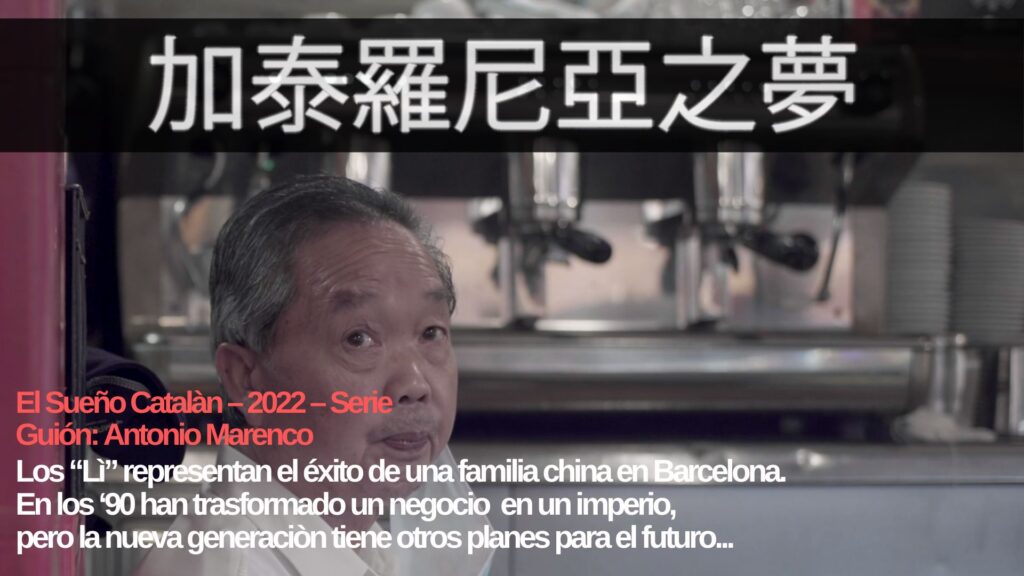
Synopsis
For seventeen years, Uncle Li has built his «Catalan Dream» from a simple bar in the Sants neighborhood into a thriving family enterprise. Now, he’s ready to pass it on to the next generation. There’s just one problem: his son wants nothing to do with it.
Growing up in Spain, the son dreams of his own version of success—opening a travel agency for tropical islands. The Catalan Dream delves into the heart of this immigrant family, capturing the intimate, often humorous, tensions between filial duty and personal ambition. With a lightweight camera and a discreet crew, this observational series offers a raw and privileged look at the universal struggle between tradition and change, all set within the four walls of a classic Barcelona bar.
Technical sheet
Genre: Observational Documentary
Format: Web Series
Episodes: 8
Runtime: 10-12 minutes per episode
Language: Spanish, Chinese (Catalan subtitles)
Shooting Format: 4K, Handheld
Visual Style: Naturalistic, intimate, following the authentic rhythm of daily life.
Director: Antonio Marenco
Teaser Link: https://youtu.be/y10EbnjmOmE
Director’s note
This series applies a sociological lens to the microcosm of a family business. I am fascinated by human behavior in the face of social change, and the Li family’s story is a perfect case study. It’s not just a story about a Chinese family in Spain; it’s a global story about the second generation, identity, and the very meaning of «success.» By earning the family’s trust and filming with a small, unobtrusive crew, we aim to capture the quiet moments and loud disagreements that define their journey, creating a portrait that is both specific and universally resonant.
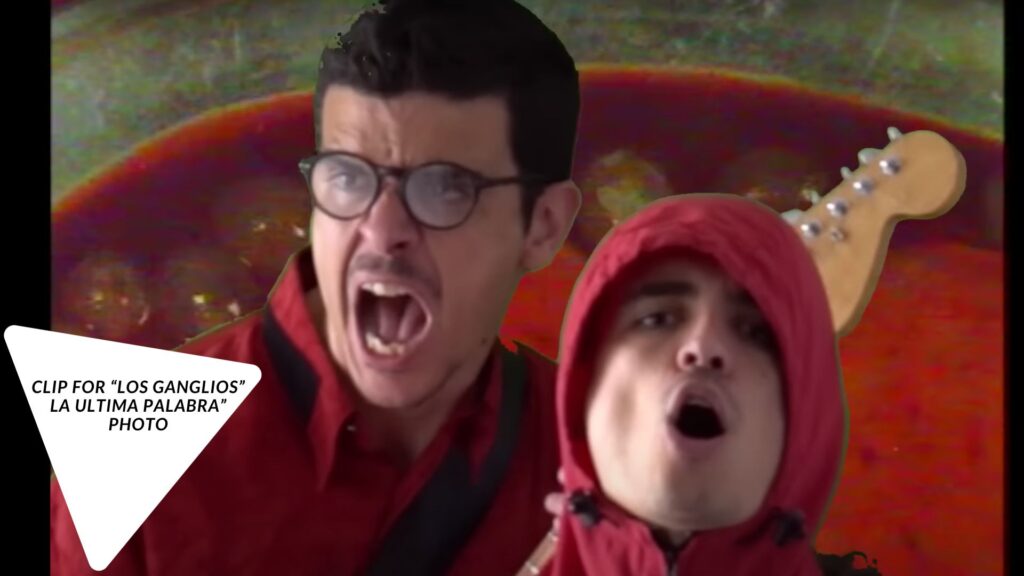

After the single «Stanza Singola» – the title track from Franco126’s first solo album – the music video for «San Siro,» another single from the Roman singer’s project, has been released. Franco126 had debuted two years ago with «Polaroid,» a track co-written and performed with Carl Brave.
The protagonist of the video is Ugo Borghetti, another member of the 126 crew, while the location is in Sicily and has a vintage feel. The song’s lyrics are also melancholic, weaving together themes of love, misunderstandings, and desires for happiness – which, in the end, would mean «waking up in the middle of the San Siro pitch.»
Set in 1982, it draws inspiration from a winning football pools (Totocalcio) ticket.
https://youtu.be/QHHyE3c7Tnk
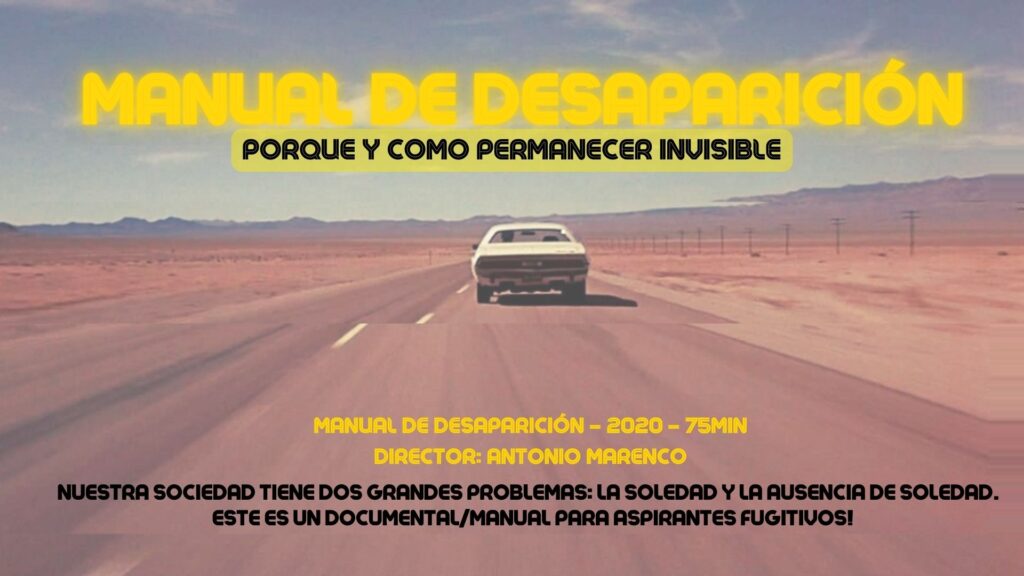
Synopsis
Manuale di Sparizione is a provocative 60-minute documentary that delves into the modern obsession with vanishing. Framed as a visual «how-to» guide, the film investigates the compelling reasons—from crushing debt and legal troubles to the simple desire for absolute freedom—that drive individuals to abandon their lives.
Through a blend of archival footage, stylized reconstructions, and expert interviews, the project unpacks the practical steps of disappearing: destroying digital footprints, securing false identities, and adapting to a life of invisibility. It juxtaposes real-life cases of both failed and successful disappearances with philosophical and sociological reflections, questioning whether true anonymity is still possible. The film navigates the thin line between the romanticized myth of the lone hero and the often-illegal, psychologically taxing reality of starting over.
Technical sheet
Genre: Investigative Documentary / Philosophical Essay
Director: Antonio Marenco
Format: Feature Documentary
Duration: 60 minutes
Status: Project in Development
Language: English
Style: Noir Aesthetic, dynamic editing blending real testimonies, archival material, and stylized reconstructions.
Visuals: High-contrast imagery, use of black and white, atmospheric lighting.
Soundtrack: Minimalist electronic music, ambient sounds, and subdued city noises.
Teaser: https://youtu.be/y0ajnhB8sP4
Director’s note
«Our era suffers from two great evils: loneliness, and the absence of solitude.» This paradox is the heart of «Manuale di Sparizione.» My goal is to use the language of cinema and my background in sociology to explore the ultimate act of rebellion in a controlled world. This is not an endorsement but an investigation—a deep dive into the human desire to become a ghost, questioning whether the ‘vanishing act’ is the last frontier of personal freedom or a dangerous illusion.

Synopsis
Permanent Together offers an intimate, behind-the-scenes look at the «Permanent» squat in Barcelona, a vibrant and self-managed social center housed in a disused factory. The documentary captures the daily life, conflicts, and creative energy of this community as they navigate the constant risk of eviction.
The film delves into the political and social tensions surrounding the space, exploring the residents’ struggle to maintain their alternative way of life in a city undergoing rapid transformation. It becomes a powerful portrait of resistance, collaboration, and the fragile existence of urban utopias in the modern city.
https://youtu.be/Z0hjhLtEPkk
ATLANTIDOC AWARD for Best Feature-Length Documentary
Dir: Patricia Ayala
The film merits recognition for having identified and foreseen the potential of an extraordinary and charismatic character with a unique life story. Don Ca achieves a warm portrait and documents Camilo’s transformation, using his personal narrative to reflect the dramatic changes in Colombian society. (International Jury)

